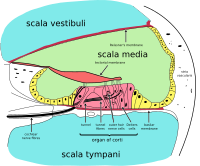
Photo from wikipedia
Inflammatory bowel disease (IBD) is often managed with anti-tumour necrosis factor-α (anti-TNFα) compounds, but only few studies have reported on long-term outcomes. We aimed to determine whether the incidence of… Click to show full abstract
Inflammatory bowel disease (IBD) is often managed with anti-tumour necrosis factor-α (anti-TNFα) compounds, but only few studies have reported on long-term outcomes. We aimed to determine whether the incidence of loss-of-response decreases with longer treatment duration. In a multicentre, retrospective cohort study of patients with IBD who received anti-TNFα for at least 4 months between 2011-2019, we compared incidence rates of loss-of-response between different intervals of treatment duration and performed parametric survival modelling to assess changes with longer treatment duration. Cox regression analysis was performed to identify predictors of loss-of-response. Secondary outcomes included overall anti-TNFα discontinuation and dose escalation. We included 900 anti-TNFα treatment episodes in 746 individual patients, with up to 9 years of follow-up. During follow-up, the most frequently observed reason for anti-TNFα discontinuation was loss-of-response (Figure 1), which occurred in 231 (25.7%) episodes, with presence of anti-drug antibodies in 67/231 (29%). Within the first year, the incidence of loss-of-response was threefold higher than after four years of treatment (17.3% versus 4.7% per patient-year, p<0.001). The incidence of overall drug discontinuation (28.6% versus 14.0% per patient-year, p<0.001) and dose escalations (36.5% versus 6.4% per patient-year, p<0.001) also decreased significantly from the first year to after four years, respectively. Risk factors for loss-of-response included stricturing or penetrating Crohn’s disease (adjusted hazard ratio [aHR] 1.67, 95% CI 1.14 – 2.44), while male sex (aHR 0.74, 95% CI 0.56 – 0.98) and concomitant immunomodulators (aHR 0.73, 95% CI 0.54 – 0.98) were protective. Long-term use of anti-TNFα maintenance treatment is associated with a reduced risk of loss-of-response in patients with IBD.
Journal Title: Journal of Crohn's and Colitis
Year Published: 2021
Link to full text (if available)
Share on Social Media: Sign Up to like & get
recommendations!